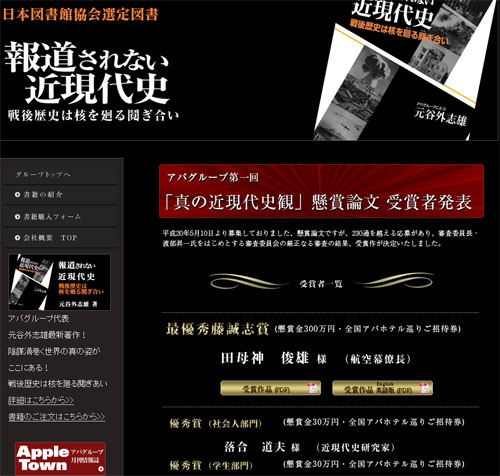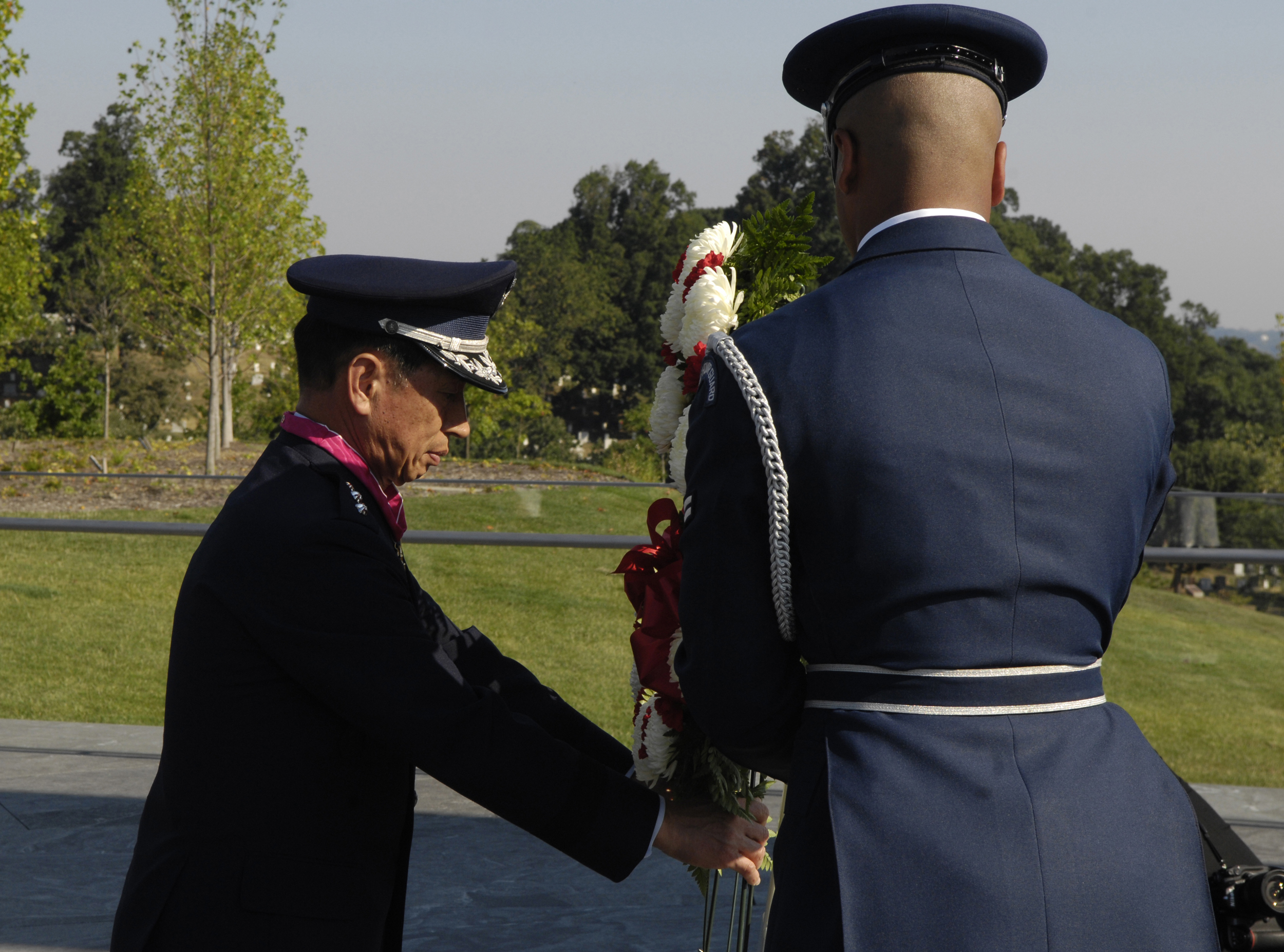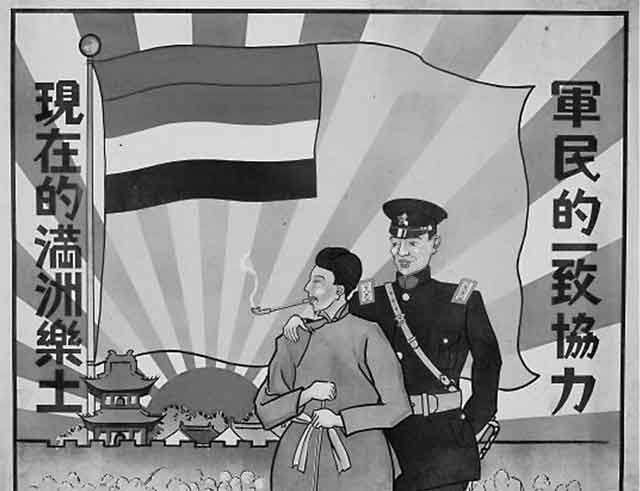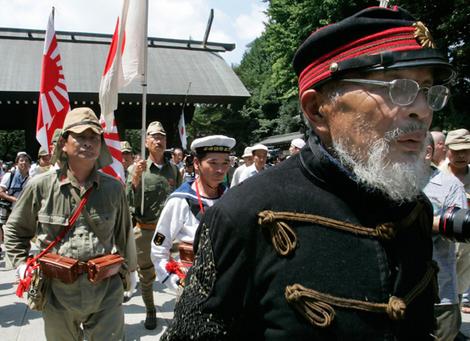Japanese translation here. Korean translation here. Czech translation here.
On October 31, 2008, General Tamogami Toshio, Japan’s Air Self-Defense Force [ASDF] Chief of Staff was abruptly dismissed from his post in the Defense Ministry, but allowed to retire with his full pension rather than be summarily fired. At a press conference several months earlier, Tamogami, who had also been the superintendent of the SDF Joint Staff College, publicly expressed contempt for a ruling by the Nagoya High Court that the Japanese military mission in Iraq was unconstitutional.1 On this occasion, the outspoken General, widely known among his peers for provocatively hawkish views, crossed several more lines.
He entered and won the top prize of 3 million yen ($30,000) in an essay contest sponsored by a large scandal-marred construction and real estate conglomerate, the APA Group, which required contestants to write on “The True Outlook for Modern and Contemporary History.” APA’s President is Motoya Toshio, the author of historical works and a key figure in political organizations supporting the Komatsu Air Base in Ishikawa Prefecture (fronting the Sea of Japan). He has strong ties to former Prime Minister Abe Shinzo and other rightist politicians, including Tamogami.2 As far as is known, superiors in the Defense Ministry’s chain of command did not carefully scrutinize Tamogami’s essay or any of the 94 essays submitted by ASDF soldiers. A notorious Nanjing atrocity denier, Professor Watanabe Shoichi, headed the panel of judges that awarded the prize. And the essays were apparently “solicited for the purpose of ‘steering Japan toward a correct understanding of history as an independent nation.’”3

The views the General expressed did more than simply contravene the official positions of his civilian supervisors. By arguing that Japanese colonial rule was humane and legal, and that Japan was not an aggressor in World War II, Tamogami contradicted the constitution and the official government stance of apology to the nation’s that Japan had invaded before and during World War II. At the same time, he placed himself at odds with the political sense of most educated Japanese people.
The text of Tamogami’s essay (Japanese) is here.
A translation of Tamogami’s essay (English) is here.
The governments of China and South Korea immediately condemned Tamogami’s views, as did Japan’s leading parliamentary opposition parties, who hoped to use the affair to topple the country’s new LDP Prime Minister, Aso Taro. Aso’s own controversial nationalist ideas on history and the constitution are similar to Tamogami’s, but as prime minister he fired the general and refrained from discussing his ideas. An unrepentant Tamogami, however, held his ground and reiterated that the Japanese “people had been misled by erroneous education” into thinking that their country once had a dark past.4
In his desire to free the Japanese military from constitutional restraints, Tamogami might have encouraged many senior and junior active-duty ASDF officers to join him in entering essays (of unknown content) in the same competition: the number varies from over 50 to as many as 95.5 The impression conveyed is that these ASDF officers are heir to the “young officers” of an earlier era who exploited ideas of a “Showa restoration” in an effort to accelerate Japanese rearmament and expansion in the 1930s. The difference is that the uniformed officers of today are supposed to be under “civilian (bureaucratic and parliamentary) control,” not in spiritual rebellion against the nation’s peace constitution. It is notable, however, that the civilian bureaucrats in the Defense Ministry, six of whom have also had their knuckles lightly rapped, initially hesitated to discipline Tamogami and his followers.

Writing on the theme, “Was Japan an Aggressor Nation?”, Tamogami argued the following:
Japanese colonial and semi-colonial rule, based on legal treaties, was “very moderate” in nature and beneficial to Koreans, Taiwanese, and Chinese alike. To defend these legally-recognized positions Japan waged justifiable wars.

It was the Comintern, according to Soviet intelligence sources, and not the Kwantung Army that might have engineered the assassination of the Chinese warlord Zhang Zuolin in 1928, which set the stage for Japan to take over all of Manchuria.
Japan never waged an illegal war of aggression in China starting in 1931, or elsewhere in the European and American colonies in Southeast Asia and the Pacific a decade later.
Manchukuo, unlike the Western colonies where racism was the basis of rule, really was a bastion of racial tolerance; so too was imperial Japan.
The Comintern and the Chinese Communist Party played an evil role in the Japan-China War, manipulating Chiang Kai-shek to attack Japan.
President Franklin D. Roosevelt “very carefully” entrapped Japan into attacking Pearl Harbor after Comintern spies, such as Harry Dexter White in the Treasury Department, wrote the “Hull Note” that helped “manipulate President Roosevelt and draw [Japan] into a war with the United States.”
“Had Japan “not fought the Greater East Asia War at that time,” it could not “have experienced the world of racial equality that we have today.” Indeed, without the War of Greater East Asia, Japan might have become “a white nation’s colony.”
In sum, Tamogami concluded, “what this country has done is wonderful.” Toward the end of his essay, citing many limitations on Japan’s Self-Defense Forces, he stresses that it should be allowed to exercise the right of collective self-defense—the implication being that it could then assist allies under attack, something that would obviously necessitate constitutional revision.
Clearly, true and false are not issues for Tamogami; belief in a “normal” (war-waging) state and more voice for the professional officer class are. The General tampers with facts; he uses evidence selectively; he cherry-picks international law when it suits his purpose; and he omits any mention of figures on Asian or Japanese civilian and military deaths from the wars of the 1930s and early ‘40s. His aim is to forge a body of activist officers who will participate in political combat, promoting the “true” perspective on history, even if it is not factually true for the particular historical period he cares about.
But none of his assertions are in any way new. For more than half a century, high ranking civilian and military officials have repeatedly made statements that provoked domestic and international controversy–either for speaking with a forked tongue on issues of war responsibility, or for reiterating, often unconsciously, crudely nationalistic sentiments of the type that Tamogami expressed. Such incidents reflect badly on the intellectual quality of the officials involved. They touch off storms of political debate within Japan and breed distrust of Japan in China, Korea, and other nations that experienced Japanese occupation. But they also serve to heighten popular vigilance against the danger of domestic militarism. Regrettably, comparable effects are seldom produced by policies initiated by Japan’s security alliance partner, the United States, whose endless war crusades and entrenched militarism have distorted national life and undermined international order.
What then are we to make of Tamogami’s views? Put aside his ignorance of history, international law, the September 8 1951 San Francisco Peace Treaty, and his misinterpretation of sources and documents such as Sec. of State Cordell Hull’s memorandum of November 26, 1941. Is Tamogami motivated by a sense of wounded self-esteem and wrong inflicted by the US and its allies on Japan after its military and ideological defeat in 1945? Is this the reason why he is unable to recognize the many unjust acts and countless crimes committed by Japan in the course of its colonialism and invasion of neighboring states? Consider, for a moment, questions of hypocrisy and double standards in assessing the actions of Japan, the United States, and other nations that went to war throughout the twentieth century.
In 1945, the US and the Soviet Union took the lead in establishing the legal nomenclature of war crimes and the principles for adjudicating them and punishing offenders. At the International Military Tribunal (IMT) at Tokyo (1946-8), a small number of Japanese leaders were prosecuted and punished for the crime of aggression and for war crimes in the narrow sense. But the problem of European, American, and Japanese colonialism was ignored. And the war crimes of the Allies, which culminated in the American terrorist bombing of sixty-four Japanese cities and the nuclear destruction of Hiroshima and Nagasaki, were also never adjudicated. During the IMT, attempts by American and Japanese defense attorneys to raise these issues were rejected out of hand.

Moreover, the United States helped Britain, France, and The Netherlands to restore their respective colonial empires by waging war to destroy the national independence movements of their former colonial subjects. While these colonial powers were professing to be defenders of civilization, sitting in judgment of Japan for pursuing policies of aggression, they themselves were continuing to commit comparable offenses.
Some Japanese conservatives can neither forgive nor forget this Western hypocrisy. For them, all distorted (i.e. “official” or “victor propaganda”) versions of Japan’s modern past trace back to the Tokyo trial. They also believe the Japanese defendants at Tokyo were denied a fair hearing. When the occupation ended in 1952 and Japan regained its formal independence, a tiny minority rejected the Tokyo trial because they could see only its negative, not its many positive sides. They began to commemorate and idealize one of the three dissenting judges on the tribunal, Radhabinod Pal. The Indian nationalist judge had been a partisan sympathizer of the Japanese military. He rejected the charge of aggression against Japan’s wartime leaders and sought their acquittal on all counts. For Pal, the real enemy in Asia was the Western White Man. Ever since that time the castigation of the Tokyo IMT’s findings has been a fixed element in Japanese right-wing thought. This is not to deny that in prosecuting Japanese war criminals the victor nations erred in key respects. One was the issue of colonialism; another was the failure to indict Emperor Hirohito, who, alone among Japan’s leaders, was at the center of events during the whole war-period. Yet Hirohito was never even questioned or made to bear moral responsibility for the war, though several of his most loyal subjects were executed or imprisoned on his account.
Tamogami is not alone in defending Japanese colonial rule and holding other far-right views of early 20th century Japanese history. But for such ideas to dominate, they must be taught in the nation’s schools and universities, widely disseminated among a majority of voters by Japanese journalists, writers, and other opinion-makers, and overcome a political-culture supportive of the peace constitution. In today’s Japan none of these conditions yet obtain. Editorial comment in the wake of Tamogami’s dismissal from office suggests that truthful views of Japan’s wars of aggression from 1931 to ’45 are widely recognized. Mainstream Japanese political culture rejects the fringe ideas associated with Yasukuni Shrine and its history Museum, and articulated here by the General.
Nevertheless, the voting public remains divided on issues of war remembrance. Many politicians in the ruling Liberal-Democratic Party, including Prime Minister Aso, share Tamogami’s shallow nationalistic sentiments, as do writers for Fuji Sankei and its affiliated media outlets. Most of these people, however, refrain from publicly expressing their sentiments on highly contentious issues such as implicitly rejecting the verdicts of the Tokyo trial or calling for Japan to exercise the right to collective self-defense in violation of its Constitution.

Suppose, however, in the coming decade, powerfully situated individuals with historical consciousness similar to Tamogami’s came to prevail among Japan’s governing elites and their advisers. Could Japan experience the reign of extremist foreign policy ideas comparable to those of the American neo-conservatives and neo-liberals whose ideas developed over a span of three decades before reaching their extreme expression in the policies of the George W. Bush and Barack Obama presidencies? Could something similar happen in Japan?
Tamogami says he is uninterested in weakening Japan’s commitment to the US-Japan Security Treaty [AMPO], or Japan’s ties to other Asian countries. He draws an analogy between America, the militaristic superpower that he calls the “parent,” and Japan, its “child.” Japanese staff officers who conform to his way of thinking imagine they can put this “parent-child” relationship on a more equitable basis by jettisoning civilian control, eliminating the Defense Ministry’s “Operational Policy Bureau,” staffed by civilian bureaucrats, and allowing “mostly uniformed officers” to “manage SDF units under the defense minister.”6
But the real problem with the US-Japan security relationship is that it is a poison injected into the arteries of Japan’s political system, continually weakening Japan’s commitment to its constitutional ideals. As long as this relic of World War II and the Cold War remains, Japan will have difficulty remaining a peace state, dealing with the criminality of its lost war, and developing an omni-directional rather than US-centered foreign policy. To defend Article 9 of the peace constitution without, at the same time, confronting AMPO is to do the work of Tamogami and people who think like him.
One final consideration: it is most unlikely that Pentagon officials would really welcome a Japan that undid constitutional restraints on the growth of its militarism, and acquired offensive weapons systems in order to become a “normal” (war-waging) state. Conversely, it isn’t clear what Japan’s leaders would do if, in the near term, the “parent” escalated its failed colonial-wars in Iraq and Afghanistan and pressured Japan to involve itself more deeply in them. Social Democratic Party leader Fukushima Mizuho understood the problem correctly, however, when she linked the SDF’s expanding role in support of America’s wars to the spread of beliefs “within the Defense Ministry that Japan’s wartime acts did not constitute aggression.”7
See an interview with the sacked Gen. Tamogami with the Japan Times, Jan. 28, 2009.
Notes
*I wish to thank Gavan McCormack and Mark Selden for sending materials used in this essay.
- Asahi Shimbun, April 19, 2008.
- Roy Berman, “Gen. Tamogami Toshio, Motoya Toshio, and Abe Shinzo,” Mutant Frog, November 4, 2008. Berman documents the close relations between company president Motoya Toshio and former Prime Minister Abe Shinzo, as well as Motoya’s support for a nuclear Japan, his writing of historical works under a pseudonym, and his ties to the Air Force support group. See also, The Mainichi Shimbun November 1, 2008.
- Jun Hong, “Axed ASDF chief hawk till the end; no apology,” The Japan Times, Nov. 5, 2008.
- Jun Hong, “Axed ASDF chief hawk till the end; no apology,” The Japan Times, Nov. 5, 2008.
- “Government needs to assume responsibility for ASDF chief of staff’s behavior,” The Mainichi Daily News, Nov. 8, 2008; AP, “Defense Minister to return part of salary over ASDF chief’s war essay,” Bereitbart.com, No. 4, 2008; “The Ghost of Wartimes Past: Japan’s History Wars Erupt Again,” Economist.com, Nov. 5, 2008.
- Shingetsu Newsletter No. 1191, News Analysis, posted Nov. 1, 2008.
- Kyodo News, “Beijing, Seoul rip ASDF chief essay,” The Japan Times, Nov. 2, 2008.


